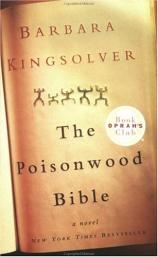Reading Group Guide
Discussion Questions
The Poisonwood Bible

1. What are the implications of the novel's title phrase, the poisonwood bible, particularly in connection with the main characters' lives and the novel's main themes? How important are the circumstances in which the phrase comes into being?
2. How does Kingsolver differentiate among the Price sisters, particularly in terms of their voices? What does each sister reveal about herself and the other three, their relationships, their mother and father, and their lives in Africa? What is the effect of our learning about events and people through the sisters' eyes?
3. What is the significance of the Kikongo word nommo and its attendant concepts of being and naming? Are there Christian parallels to the constellation of meanings and beliefs attached to nommo? How do the Price daughters' Christian names and their acquired Kikongo names reflect their personalities and behavior?
4. The sisters refer repeatedly to balance (and, by implication, imbalance). What kinds of balance--including historical, political, and social--emerge as important? Are individual characters associated with specific kinds of balance or imbalance? Do any of the sisters have a final say on the importance of balance?
5. What do we learn about cultural, social, religious, and other differences between Africa and America? To what degree do Orleanna and her daughters come to an understanding of those differences? Do you agree with what you take to be Kingsolver's message concerning such differences?
6. Why do you suppose that Reverend Nathan Price is not given a voice of his own? Do we learn from his wife and daughters enough information to formulate an adequate explanation for his beliefs and behavior? Does such an explanation matter?
7. What differences and similarities are there among Nathan Price's relationship with his family, Tata Ndu's relationship with his people, and the relationship of the Belgian and American authorities with the Congo? Are the novel's political details--both imagined and historical--appropriate?
8. How does Kingsolver present the double themes of captivity and freedom and of love and betrayal? What kinds of captivity and freedom does she explore? What kinds of love and betrayal? What are the causes and consequences of each kind of captivity, freedom, love, and betrayal?
9. At Bikoki Station, in 1965, Leah reflects, "I still know what justice is." Does she? What concept of justice does each member of the Price family and other characters (Anatole, for example) hold? Do you have a sense, by the novel's end, that any true justice has occurred?
10. In Book Six, Adah proclaims, "This is the story I believe in . . ." What is that story? Do Rachel and Leah also have stories in which they believe? How would you characterize the philosophies of life at which Adah, Leah, and Rachel arrive? What story do you believe in?
11. At the novel's end, the carved-animal woman in the African market is sure that "There has never been any village on the road past Bulungu," that "There is no such village" as Kilanga. What do you make of this?
The Poisonwood Bible
- Publication Date: October 1, 1999
- Genres: Fiction
- Paperback: 560 pages
- Publisher: Harper Perennial
- ISBN-10: 0060930535
- ISBN-13: 9780060930530








